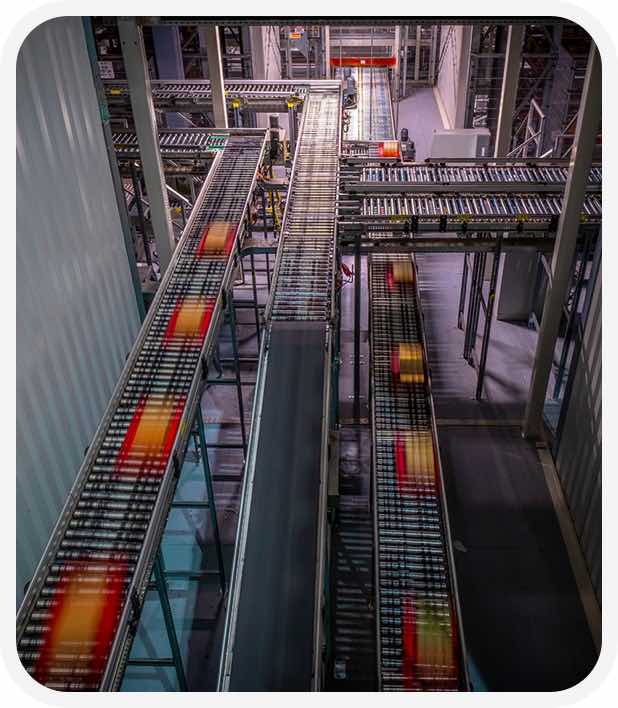The supply chain shapes our lives
Spartan experts reveal why it matters
The term “supply chain” seems to have been used more in the last year than ever before. But aside from making sure there are enough disinfectant wipes on grocery store shelves, what exactly is supply chain management and why does it matter?
Faculty in MSU’s Supply Chain Management department have answers to those questions.

Their expertise and approach has helped propel the Broad College of Business undergraduate SCM program to the No. 1 spot in U.S. News & World Report’s national rankings for 10 years consecutively and its graduate SCM program and MBA concentration for five years in a row.
In addition, MSU’s supply chain program has earned a reputation for producing industry-shaping research and faculty partnerships with industry leaders. Spartan supply chain experts — ranked No. 1 for a decade in empirically focus supply chain research output — tackle challenges that go beyond the movement of products we use in our daily lives to actively address issues related to the health care sector, inclusion in the workforce as well as sustainability, to name a few.
How does supply chain shape our lives?
“Supply chain management plays a central role in the quality of life we enjoy every day, whether it be products we shop in a retail store or meals that our kids are served in school,” says Sriram Narayanan, Kesseler Family Endowed Faculty Fellow of Supply Chain Management. “It makes products and services affordable, accessible and available to every human being in the planet.”
Narayanan is working to make supply chains more efficient and human-centric, two concepts that may seem in opposition. He and colleagues are researching increasing the inclusion of employees with disabilities in the workforce and how this can benefit workplace productivity.

In addition to making supply chains more inclusive, Spartan supply chain faculty are also looking at ways to make them more resilient and secure. The COVID-19 pandemic and the resulting shortages and supply chain breakdowns showed many of the weaknesses in distribution and logistics.
“Supply chain management is the first mile, the last mile and the middle mile of a product’s life cycle,” says Steven Melnyk, professor of supply chain and operations management. “Today, supply chain management goes beyond operations and logistics and includes sustainability, security and innovation. Supply chain managers design and manage systems that ensure a safe and desired outcome, such as considering temperature control with vaccine distribution. Without an effective supply chain, you cannot hope to succeed, and you surely will fail.”
Melnyk has examined the serious supply chain vulnerabilities exposed by the pandemic and says more events of this kind are ahead.
“Global risk events are here to stay — it’s not only a supply chain issue — it’s a leadership issue,” Melnyk and co-author Simon Knowles write in a recent white paper. “Given we can expect to see more global risk events similar to the COVID-19 pandemic taking place, we cannot afford to return to the old ways of doing things — that ship has sailed. It’s time for leadership to look at the question, ‘Do we have the right supply chain model in place now?’ The answer to this question is not for supply chain managers, it is a question that must be addressed at the top management team/board level. It will influence the ability of the firm to not only compete but simply to survive.”
What makes MSU No. 1 in supply chain?
“MSU was one of the first programs to consolidate the logistics, operations and sourcing academic functions all into one department,” says Stanley Griffis, Bowersox-Thull Professor in Logistics and Supply Chain Management. “Thinking about how that supply chain creates value, rather than simply reducing cost or delivering goods, is a much deeper issue and a hallmark that underlies our educational approach at all levels: undergraduate, master’s and doctoral.”
Griffis is an example of how supply chain faculty also lend their expertise to faculty in other MSU colleges. He and a colleague formerly in MSU’s Department of Fisheries and Wildlife are collaborating on a project funded by the National Science Foundation to disrupt wildlife trafficking, a $23-billion-per-year criminal enterprise that relies on illegal supply chain networks.

In addition to the interdisciplinary nature of their work, faculty members also offer students a more robust curriculum compared to other supply chain programs.
“Our program takes a holistic approach and educates students in the three major functional areas of supply chain management, which are purchasing (‘buy it’), operations (‘make it’) and logistics (‘move/store it’),” says Simone Peinkofer, assistant professor of supply chain management. “Our students gain an in-depth understanding of the importance and interconnectedness of these three areas and how to effectively manage them, which sets them apart from other students.”
“A significant majority of our peers provide operations management programs rather than wider supply chain management programs like MSU offers,” says Vedat Verter, chairperson of the supply chain management department and John H. McConnell Chair in Business Administration. “Our undergraduate and master’s programs are designed to elevate this ‘end-to-end’ approach, and the extent of our partnerships with partners across all industries is a differentiating characteristic of our programs.”
What’s the future of supply chain?
At a time when the world has access to unprecedented resources, people power and global connectivity, it also faces never-before-seen complexities and challenges.
“The world today grapples with issues of inequity in an era of ever-abundant prosperity,” says Narayanan. “These inequities have been exacerbated by the pandemic and grand challenges such as climate change. Supply chain management will increasingly play a critical role not only in improving peoples’ quality of life but also doing it in a conscientious manner that takes community and the planet’s well-being into account.”

“Emerging technologies like blockchain, 3D printing and more intelligent robots also are shaping the future of supply chains, requiring academics to develop methodologies to better incorporate big data and technology into their decision-making processes,” says Verter.
Society faces a constellation of challenges, and new realities may seem daunting, but for tomorrow’s supply chain leaders, they also reveal opportunities to innovate.
“The ability to respond to changes from past experience will be highly useful to supply chains, however, the trick will be accomplishing that while still being efficient,” says Griffis. “The good thing about the supply chain business is, there are always enough challenges to go around, which is great news for our graduates.”